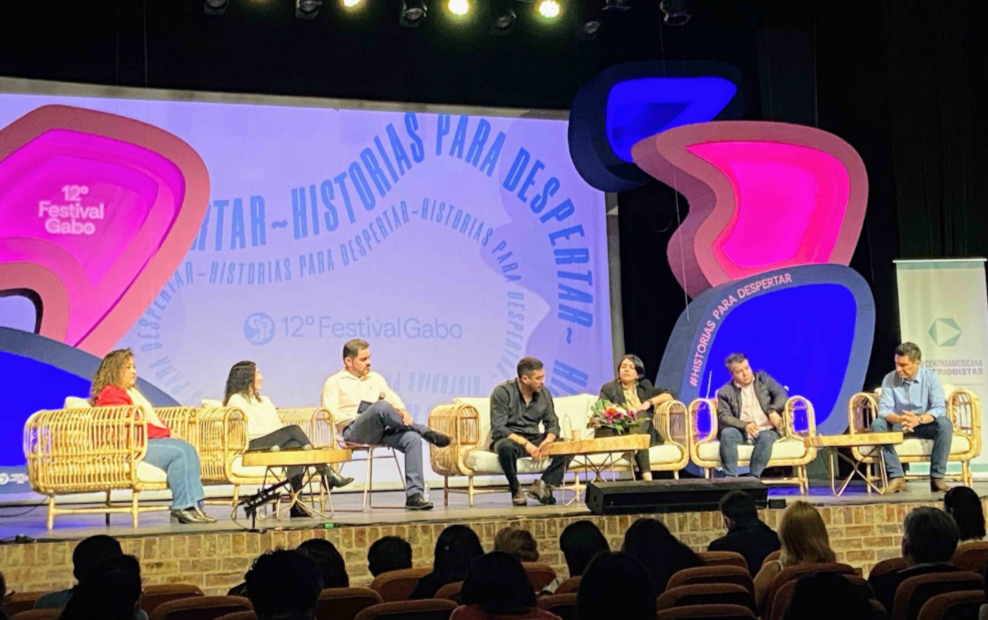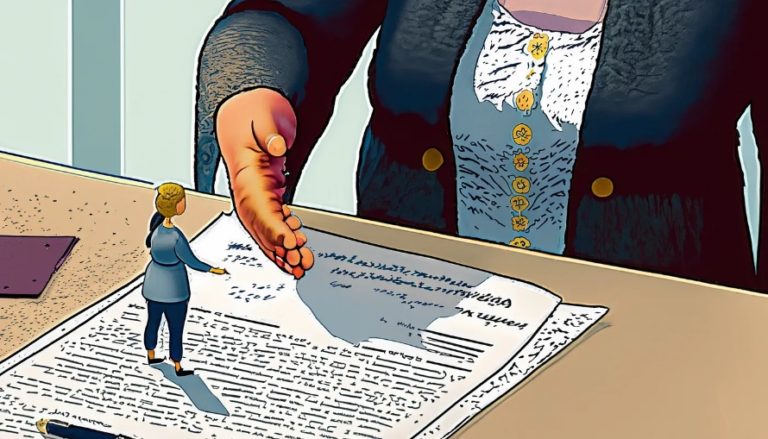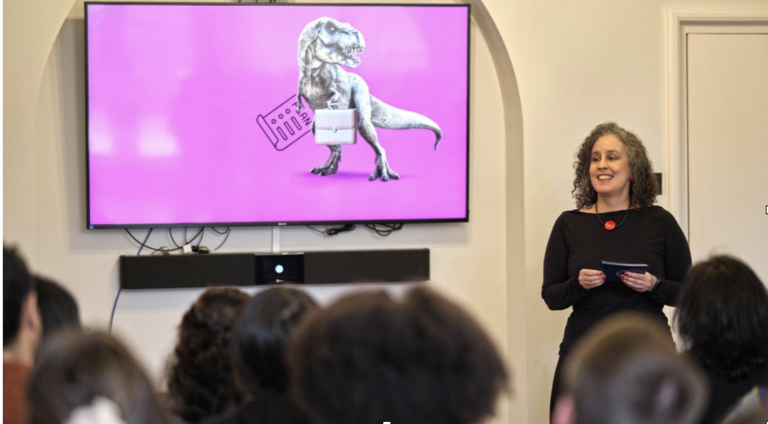Ants and cicadas in pursuit of the truth: This is what we learned about journalism in Latin America at the Gabo 2024 Festival.
Source: Reuters Institute
Organized by Jaime Abello's team with the coordination of Daniel Marquínez, this meeting reminds us of the value of journalism in the region.
Angélica Cárcamo, Marielos Monzón, Álvaro Murillo, Óscar Martínez, Jennifer Ávila, Wilfredo Miranda y José Carlos Zamora en el Festival Gabo de Bogotá.
By Eduardo Suarez
There was a moment on the last day of the Gabo Festival that defined the vitality of the best Latin American journalism, the many challenges it faces and the incalculable value of this annual gathering.
It occurred during this conversation on the state of press freedom in Central America, moderated by reporter Óscar Martínez and adding the vibrant voices of Salvadoran Angélica Cárcamo, Guatemalan Marielos Monzón, Honduran Jennifer Ávila, Nicaraguan Wilfredo Miranda, Costa Rican Álvaro Murillo and José Carlos Zamora, son of journalist José Rubén Zamora, in prison and awaiting trial for the past two years for an unfair trial.
The judicial offensive against Zamora, condemned by the United Nations and several press freedom associations, is one of the most extreme examples of the harassment suffered by those who expose abuses of power in Central American countries, but not the only one.
Cárcamo mentioned the harassment by networks of trolls in the pay of authoritarian governments and the frequent passivity of traditional newspapers. Avila explained how she and her colleagues at Contracorriente are forced to devote more and more resources to deal with judicial threats and the right to be forgotten, which political and economic power uses to hide its misdeeds. Monzón pointed to the aggressive language of populist leaders against the free press: "They equate journalists with criminals and compare newsrooms with criminal dens, but we continue to do our work".
It is not an easy job. Not even in the once placid Costa Rica, the destination for decades of so many journalists in exile and where, as Murillo explained, aggressive rhetoric against the press is increasingly frequent. But no country is in as difficult a situation as the Nicaragua of tyrants Daniel Ortega and Rosario Murillo, where there is not a single reporter left who can sign off on a story.
"Nicaragua is the only country in the world without a single printed newspaper. "The regime has managed to make it impossible for us to report inside the country," said Miranda, who admitted that it is very difficult to report what is happening in his native country from exile and recalled the case of imprisoned journalist Victor Ticay .
It was a collective therapy session, but also a deeply inspiring conversation and a reminder of the ability of this annual meeting to define the problems of Latin American journalism, discuss possible solutions and imagine together a different kind of journalism in a safe, relaxed and global environment.
An endless number of ants
The festival, carefully organized by Jaime Abello Banfi and Daniel Marquínez's team, brought together pioneers such as Luz Mely Reyes, Olga Lucía Lozano, Sindo Lafuente, Héctor Feliciano and Carmen Aristegui along with younger voices such as Claudia Báez, Natalia Viana and Abraham Jiménez Enoa.
There was a sports journalism workshop given by Spanish reporter Natalia Torrente, who uncovered the exclusive key to the Rubiales case, and a master class by Catalan photographer Anna Surinyach. There were also meetings on audio, digital security or investigative journalism, and activities on common challenges such as polarization or artificial intelligence.
With no patience for nostalgics, pessimists or doomsayers, the festival did not revolve around yesterday's journalism but around the journalism that Latin American reporters build every day with ingenuity and the conviction that the best is yet to come. The Gabo Foundation, which breathes oxygen into this community every year at this event, has also helped to document its footprint through the two chapters of the investigation El Hormiguero, the second of which was presented in Bogota by Germán Rey, Juan Manuel Lucero and Mariana Alvarado. Both works reflect the employment of thousands of reporters who work like industrious ants in 1,757 digital media in 17 countries in the region. Among them is already in its own right the brand new Boom project, presented in Bogota by Boris Muñoz and other colleagues hand in hand with this stark documentary on the Darien.
The examples are innumerable. The environmental journalism of Ojo Público and that of the alliances El Clip or Amazon Underworld, which won this year's award for coverage. The work of Venezuela's Fake News Hunters, who strive to disprove politicians in one of the most tense and least free environments in the region. The willingness of Catalina Gomez Angel and Nataliya Gumenyuk to document Putin's war crimes in Ukraine. The profound humanity of the stories of a war brought to the stage by Mónica Ceberio , Teresa Gamaza Acuña , Cristian Segura , Jacobo García , Carlos Martínez and Luis Doncel .
Reports that combat forgetfulness like this one by Marcela Turati about a woman in search of her mother and chronicles that uncover global networks of abuse like this award-winning masterpiece about badly wounded horses by Argentines Anita Pouchard Serra and Diego Fernández Romeral. Podcasts that paint a stark portrait of power like this one on Bukele by Gabriel Labrador , Silvia Viñas and Eliezer Budasoff , and others that give voice to silenced groups like this one by Nayeli López Reyes on the rights of women in the Triqui community of Oaxaca that won the award in the audio category.
Not all journalism nor all journalists are like this. There are cowardly newspapers, slave editors, paid propagandists, henchmen of power who pass themselves off as reporters, biased newspapers or those devoted to sensationalism, stenographers who embody everything they do not want to be. And yet, every year the festival gives us a glimpse of the utopia of believing that another kind of journalism is possible in Spain and Latin America without a drop of nostalgia and taking advantage of the opportunities offered by the digital environment.
Hallucinated men and historical women
This conviction is not the fruit of faith but of conversations with dozens of brilliant journalists and detailed observation of their work, often created in difficult circumstances but driven by courage, curiosity and the vocation to tell the stories of Latin America, a land that Gabriel García Márquez defined in the famous Nobel speech as "that immense homeland of hallucinated men and historical women whose endless stubbornness is confused with legend".
I am sure that many Latin American reporters will say "Hallucinated and stubborn?" That's us!" because a certain degree of stubbornness and quixotic hallucinations is necessary to persevere when journalism is exercised in such a hostile environment.
The festival did not ignore these threats. Luz Mely Reyes reminded us that "polarization is a trap" that can push us to stop covering what really matters. Nelly Luna explained that the climate crisis is "an eminent economic issue" and that we should cover it as such. Karen Hao encouraged us to ignore the propaganda of big business and to show in our stories how the artificial intelligence revolution is affecting people today.
In a world often dominated by a cacophony of creators, activists and influencers, we discussed one of the great challenges of the moment: distinguishing what is public interest journalism from what is not.
The Argentine Vanina Berghella, regional director of this fund that raises money for media around the world, highlighted transparency in editorial processes, ownership and financing as distinguishing features.
Diplomat John Feeley, now director of this center for media integrity in the Americas, defined public interest journalism as "that which does not respond to the special interests of rulers, opposition parties, foreign governments, corporations or organized crime" and my dear Ricardo Corredor reminded us that it is not enough for the media to have standards: they must also have mechanisms to receive complaints if those standards are not met.
Yolanda Ruiz, head of the Gabo Foundation's Ethics Clinic, told how the social outburst in Colombia had made her reflect on the diversity of the media and pointed out that the general criticism of the press is the result of the fact that our work is in the public eye.
Like cigarettes
In this environment, those of us who work at the Reuters Institute aspire to contribute two things: scientific evidence to help us understand how audiences approach the news today, and a space where we can explore together the future of journalism in the region and beyond. That spirit took us to Bogota to share the main findings of this year's Digital News Report, talk with media leaders in a meeting coordinated by our Tania Montalvo and promote the best climate journalism in a workshop led by our Diego Arguedas Ortiz.






